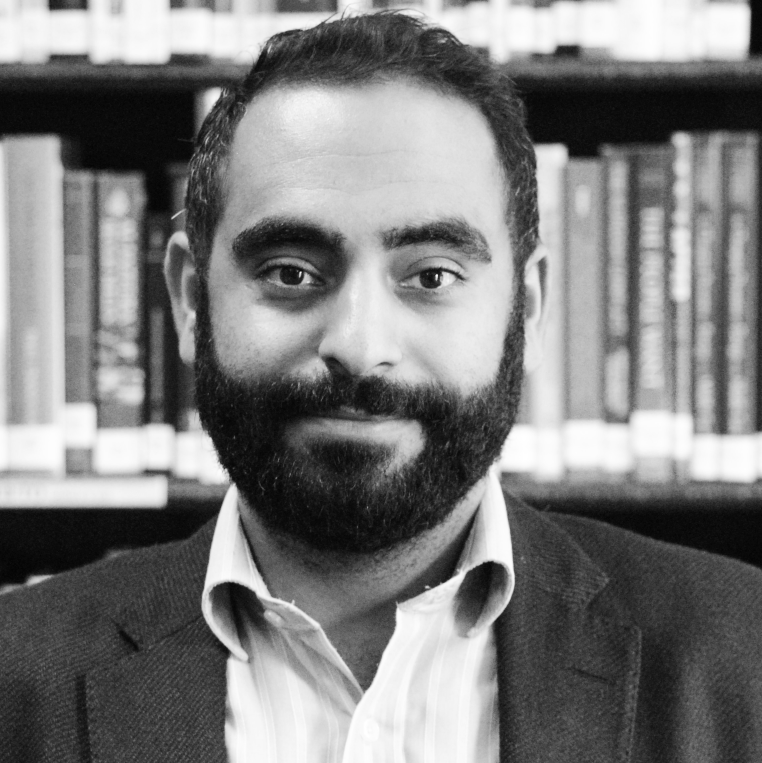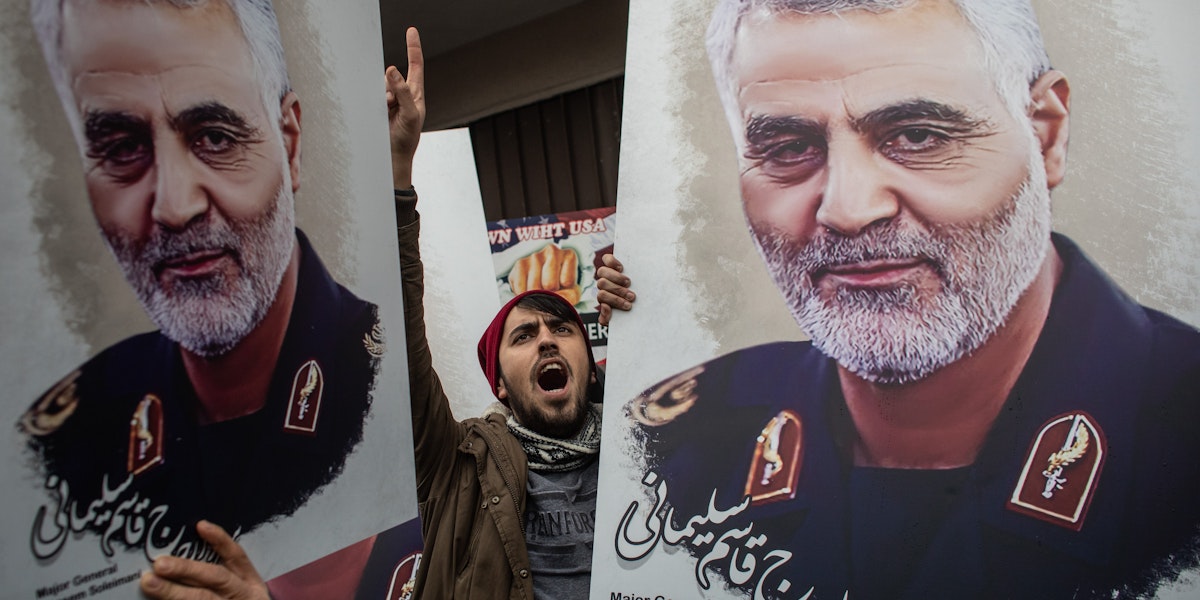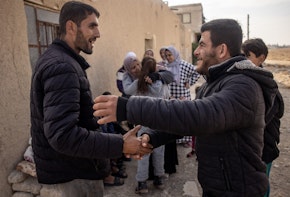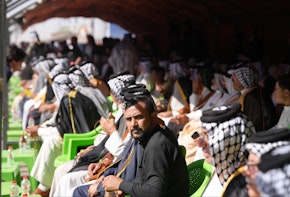The assassination of Qassem Soleimani has escalated the simmering conflict between the United States and Iran. The region is already tense, with hot wars still underway in multiple countries. From the perspective of many civilians in the Middle East, the United States and Iran are both destabilizing, foreign interventionary powers, although the United States possesses considerably more military power and international influence.
As the consequences of this radical shift in U.S. policy take shape, we can expect repercussions on such matters as war and peace, the United States presence in the Middle East, and the fate of authoritarian regimes that had faced calls for reform from popular protest movements. In this roundtable discussion, TCF’s foreign policy researchers explore some of the most important consequences of the Soleimani assassination.
 Dina: The assassination of General Qassem Soleimani was extremely significant for Iranians, even though many were recently protesting his regional policies. By assassinating him, President Trump achieved more than what the Iranian government could ever dream of: bringing together frustrated and fragmented Iranians in the face of an external enemy. Massive crowds gathered in Iran to commemorate Soleimani’s death. This is no surprise: Iran is no different to any other country, and Iranians are proud, nationalistic, and unified by the presence of an external threat. The “maximum pressure” campaign started this process a while ago, especially amongst the Iranian elite, but affected Iranians more broadly too.
Dina: The assassination of General Qassem Soleimani was extremely significant for Iranians, even though many were recently protesting his regional policies. By assassinating him, President Trump achieved more than what the Iranian government could ever dream of: bringing together frustrated and fragmented Iranians in the face of an external enemy. Massive crowds gathered in Iran to commemorate Soleimani’s death. This is no surprise: Iran is no different to any other country, and Iranians are proud, nationalistic, and unified by the presence of an external threat. The “maximum pressure” campaign started this process a while ago, especially amongst the Iranian elite, but affected Iranians more broadly too.
This doesn’t mean Iranians condoned Soleimani’s methods or that he has universal support. They have been critical of their government’s policies and spending in the region, particularly as Iran faced sanctions at home. But Soleimani’s lifetime devotion to defending the Iranian nation, particularly visible during the fight against ISIS, prompted these shows of unity. While Soleimani’s loss is significant for Iran and its regional policy—though he is replaceable and Iran will ensure continuity in its regional efforts—Trump’s move was a gift to the Iranian government. They could never have dreamed of achieving such shows of support at such a difficult time economically and following serious protests. This isn’t a statement of support for the Islamic Republic, but a strong statement that many Iranians will stand with their government when faced with external enemies.
Collateral Damage: Partnership with Iraq

Dan: The assassination will have even more immediate impact in Iraq. The killing of Iranian General Qassem Soleimani may well turn out to be the moment when the Trump administration decisively sacrificed America’s partnership with Iraq at the altar of a dangerous maximum pressure campaign against Iran with no end in sight. It remains to be seen whether the administration and Iraq will at the last minute salvage some enduring U.S. presence inside Iraq. Regardless, the damage has been done. It is hard to see how troops can safely and effectively continue their active anti-ISIS military role or perform their mission of training Iraqi forces, and harder still to see how the Trump administration can meaningfully exercise political influence with Iraq’s government after killing a guest of the Iraqi government, on Iraqi soil, alongside former senior Iraqi security officials, without Iraq’s consent. Trump’s bluster, in offhandedly threatening to bomb revered Iranian cultural sites or to reinstate sanctions on Iraq if they ordered the withdrawal of U.S. forces—which, when enacted in the 1990s, fueled a devastating humanitarian crisis—is blind to Iraqi politics, heedless of U.S.–Iraq relations, and indifferent to whether America stays or goes, or both.
The downgrading has already begun. Military reinforcements are guarding a hunkered-down diplomatic skeleton crew left to navigate a political crisis in Baghdad. U.S. cooperation with Iraqi forces fighting the Islamic State has already halted indefinitely, and the group has begun exploiting the chaos, with an attack on Sunday in Kirkuk that killed two Iraqi soldiers. None of this bodes well for Iraq’s future security or stability. Even before the killing of Soleimani, there was reason to worry that Iraq was heading down a dangerous path of violent unrest, divisive and ineffective governance, creeping authoritarianism, and the politicized hollowing out of security institutions. And unfortunately, we’ll be hearing more about how ISIS takes advantage of the opening provided by recent events. I fear each of those trendlines may accelerate as America pulls back.
Toxic Political Impact

Renad: The U.S. strike on Qassem Soleimani and Abu Mahdi al-Muhandis will have implications on both Iraqi domestic and international politics. Domestically, the event has brought together a fragmented Shia political elite under the unifying force of anti-Americanism. Shia populist cleric Muqtada al-Sadr, who for years had positioned himself and his movement as anti-Iran and anti-militia, is now calling for the formation of a resistance force, akin to his formidable militia, the Mahdi Army, to fight against Americans. This move brings him closer to his former foes from the Popular Mobilization Forces (PMF) such as Qais al-Khazali and Hadi al-Ameri. More generally, the protests that erupted in Iraq in the past few months are now at risk of being sidelined, as Shia parties switch their focus to anti-Americanism rather than the reform narrative. Already, Sadrists have begun clashing with other protesters in the squares of Baghdad and southern Iraq. In short, the U.S. strike threatens to send Iraq back to the days of U.S. occupation, defined by sect-based political mobilization, and turn back the progress of reform language and movements that defined much of southern Iraq and Baghdad in recent years.
Mistrust Instead of Cooperation
 Thanassis: Military cooperation between Iraq and the United States will shift from a partnership with some problems to an adversarial relationship rife with mistrust. There will be little room for successful collaboration on key areas of shared interest—securing Iraq’s borders, keeping ISIS under control—now that the United States has so egregiously violated the terms on which its troops were stationed in Iraq since 2014. None of the specifics will change that fundamental dynamic. Perhaps the United States will have to leave quickly, perhaps slowly; perhaps it will be allowed to keep a small number trainers or other special troops. But it will not have the willing partnership and free hand that it has had since 2014. Strategically, Iran and ISIS will benefit. Most significantly, though, the Iraqi population will continue to see their security erode.
Thanassis: Military cooperation between Iraq and the United States will shift from a partnership with some problems to an adversarial relationship rife with mistrust. There will be little room for successful collaboration on key areas of shared interest—securing Iraq’s borders, keeping ISIS under control—now that the United States has so egregiously violated the terms on which its troops were stationed in Iraq since 2014. None of the specifics will change that fundamental dynamic. Perhaps the United States will have to leave quickly, perhaps slowly; perhaps it will be allowed to keep a small number trainers or other special troops. But it will not have the willing partnership and free hand that it has had since 2014. Strategically, Iran and ISIS will benefit. Most significantly, though, the Iraqi population will continue to see their security erode.

Dan: Over the past few years, the U.S.–Iraqi partnership has brought clear benefits to both sides. The presence of U.S. troops has not only helped Iraqi security forces fight terrorists—but functioned as a counterbalance, however inconsistent and imperfect, to the predominant influence of Iran, Shia-dominated militias, and the worst majoritarian tendencies of Iraq’s ruling parties at the expense of Kurds, Sunnis, and other religious minorities. It has been profoundly in America’s interest to help lower the odds that Iraq would lapse into jihadist insurgency, civil war, or outright Iranian domination. For the foreseeable future, that role within Iraq appears to be over. In the end, Trump chose pressure on Iran over partnership with Iraq, and is likely to be disappointed on both counts.
Iran’s Enduring Regional Agenda
 Michael: I think Dan makes a very important point here. These actions reflect a total lack of interest or care in the U.S.–Iraq relationship. For this administration, Iraq has and continues to be primarily a vehicle for confronting Iran. Its Iraq policy is in many ways simply a function of its Iran policy. This administration doesn’t take Iraqi sovereignty seriously and has acted accordingly. And through the voluntary assumption of these risks they have made clear that this relationship is expendable. That’s unfortunate for all the reasons discussed above, but it’s also incredibly myopic when weighed against the strategic ramifications of this action (without even mentioning the legal issues presented by this action). At a practical level, assassinating Soleimani is not going to have a material impact on Iran’s ability to pursue its regional agenda or project power. Its successes in that regard have been the product of opportunity, institutional capacity, and structural advantages that will not be impacted by the loss of one man. While Soleimani was perceived as an iconic, charismatic leader, his high profile also had negative costs for Iran in further focusing attention on the negative role played by Iran throughout the region. That persona galvanized criticism and the ubiquity of his battlefield images suggested that Iran’s regional critics were right when they pointed to Iran’s hegemonic ambitions.
Michael: I think Dan makes a very important point here. These actions reflect a total lack of interest or care in the U.S.–Iraq relationship. For this administration, Iraq has and continues to be primarily a vehicle for confronting Iran. Its Iraq policy is in many ways simply a function of its Iran policy. This administration doesn’t take Iraqi sovereignty seriously and has acted accordingly. And through the voluntary assumption of these risks they have made clear that this relationship is expendable. That’s unfortunate for all the reasons discussed above, but it’s also incredibly myopic when weighed against the strategic ramifications of this action (without even mentioning the legal issues presented by this action). At a practical level, assassinating Soleimani is not going to have a material impact on Iran’s ability to pursue its regional agenda or project power. Its successes in that regard have been the product of opportunity, institutional capacity, and structural advantages that will not be impacted by the loss of one man. While Soleimani was perceived as an iconic, charismatic leader, his high profile also had negative costs for Iran in further focusing attention on the negative role played by Iran throughout the region. That persona galvanized criticism and the ubiquity of his battlefield images suggested that Iran’s regional critics were right when they pointed to Iran’s hegemonic ambitions.
A March to War?
 Thanassis: My greatest long-term fear is that we’re seeing an intentional push to war by a U.S. administration that wanted direct confrontation with Iran from day one and that has no scruples about making up fake facts to justify an illegal and unjustifiable war. Of course, it’s premature to declare that World War III is about to break out, but it’s just as baseless to declare that somehow, reason will prevail and no one in Tehran or Washington will miscalculate. The stakes are tremendously high, and we’ve been on a distressing path ever since President Trump declared his interest in pulling out of the nuclear deal with Iran, which he was talking about even before his inauguration.
Thanassis: My greatest long-term fear is that we’re seeing an intentional push to war by a U.S. administration that wanted direct confrontation with Iran from day one and that has no scruples about making up fake facts to justify an illegal and unjustifiable war. Of course, it’s premature to declare that World War III is about to break out, but it’s just as baseless to declare that somehow, reason will prevail and no one in Tehran or Washington will miscalculate. The stakes are tremendously high, and we’ve been on a distressing path ever since President Trump declared his interest in pulling out of the nuclear deal with Iran, which he was talking about even before his inauguration.
 Michael: Even after Iran’s retaliatory missile strikes against Iraqi bases hosting U.S. and coalition personnel, there remains a real possibility of further escalation. Prior to Iran’s direct military response, the immediate trajectory of events largely depended on Iranian decisions and the nature of their retaliatory response. That response did not result in U.S. or coalition casualties and offers the possibility of a temporary halt to escalatory dynamics, but we should be cautious in seeing the latest developments as an end to this episode or a victory for the Trump administration’s approach.
Michael: Even after Iran’s retaliatory missile strikes against Iraqi bases hosting U.S. and coalition personnel, there remains a real possibility of further escalation. Prior to Iran’s direct military response, the immediate trajectory of events largely depended on Iranian decisions and the nature of their retaliatory response. That response did not result in U.S. or coalition casualties and offers the possibility of a temporary halt to escalatory dynamics, but we should be cautious in seeing the latest developments as an end to this episode or a victory for the Trump administration’s approach.
The fact that events have not yet spiralled into much broader regional conflict should not be understood as a vindication of recent U.S. military strikes. It should not be particularly reassuring that such disasters have been avoided for the moment. We still do not know if Iran’s missile attacks on two U.S. bases in Iraq represent the sum total of Iranian responses, and further retaliatory responses may still be forthcoming. We should also be mindful of the ways in which happenstance and good fortune have played a part here. The idea that military actions are controllable and can always be finely calibrated for the intended policial effect is problematic. A miscalculation or mishap in which the Iranian response produced American casualties could have easily tipped the crisis into outright conflict, and that possibility reflects the reckless assumption of risk that resulted from the assassinations. For instance, it is bizarre to hear American officials speculating that Iran avoided American casualties on purpose—as if such an outcome were entirely under their control—when just a week earlier Iran was held responsible for another attack on a base in Iraq which did kill an American.
As for the deterrent impact resulting from the assassinations and the further U.S. threats of a devastating military response, it’s worth bearing in mind that such a direct and overt Iranian military strike against the United States or U.S. interests would have previously been inconceivable. So recent events have had important precedential impact in expanding the potential parameters of U.S.–Iranian conflict. There is also no reason to assume that, going forward, Iran will modulate regional behavior and their actions in the various conflict zones in which they now operate, including Syria, Yemen, Iraq, and elsewhere.
And as mentioned previously, there are a host of second and third order effects that have already negatively impacted the U.S. position in Iraq and our relations with our closest allies in Europe. This has been a crisis of choice that remains difficult to justify.
The Second Target
 Thanassis: Remember that Soleimani wasn’t the only high profile target of the American strike: the United States also killed Abu Mahdi al-Muhandis, the most influential militia leader in Iraq. Mohandes thwarted some American ambitions, but he was also the only figure who had a chance of unifying the country’s many pro-Iran militias under a unified chain of command—a necessary precursor to stability in Iraq. By killing Soleimani and Muhandis, America has transformed the political environment for the worse. Iraqis who have been bravely protesting government corruption (and have been facing death for their courageous stand) now face further marginalization and violence. And the many Iraqis who would like the United States military to remain in the country—as a bulwark against ISIS and a hedge against Iranian domination—no longer have the political space to openly advocate for some form of continued American military presence. With a thuggish assassination and then thuggish threats in the afermath, the United States has destroyed any political space for compromise.
Thanassis: Remember that Soleimani wasn’t the only high profile target of the American strike: the United States also killed Abu Mahdi al-Muhandis, the most influential militia leader in Iraq. Mohandes thwarted some American ambitions, but he was also the only figure who had a chance of unifying the country’s many pro-Iran militias under a unified chain of command—a necessary precursor to stability in Iraq. By killing Soleimani and Muhandis, America has transformed the political environment for the worse. Iraqis who have been bravely protesting government corruption (and have been facing death for their courageous stand) now face further marginalization and violence. And the many Iraqis who would like the United States military to remain in the country—as a bulwark against ISIS and a hedge against Iranian domination—no longer have the political space to openly advocate for some form of continued American military presence. With a thuggish assassination and then thuggish threats in the afermath, the United States has destroyed any political space for compromise.
 Michael: I think we need to talk more about Abu Mahdi al-Muhandis, whose assasination has been largely overshadowed by Soleimani’s, and ignored by Western analysts. Whether the United States knowingly assassinated Muhandis is not totally clear at this point, but his death is equally important in understanding the very real anger against the United States among much of the Shia political class and among segments of the population. While Muhandis had been designated a terrorist by the United States years prior, he had also been a member of parliament and had most recently risen to the powerful post of deputy head of the PMF. In that role he was effectively a senior Iraqi political official, and his death on Iraqi soil at the hands of the United States encapsulated for some the arrogance of the United States and the lack of trust between the countries. While a problematic figure from the perspective of the United States, killing Muhandis is still fundamentally different to the assassination of Soleimani, as he was an official from an ostensible U.S. partner. His deep connection with the PMF and the anger unleashed by his death on Iraqi soil may make force protection an impossibility for the United States going forward. At the very least, it has helped poison the atmosphere and undermine the tenuous but largely effective security cooperation that had been forged since 2014.
Michael: I think we need to talk more about Abu Mahdi al-Muhandis, whose assasination has been largely overshadowed by Soleimani’s, and ignored by Western analysts. Whether the United States knowingly assassinated Muhandis is not totally clear at this point, but his death is equally important in understanding the very real anger against the United States among much of the Shia political class and among segments of the population. While Muhandis had been designated a terrorist by the United States years prior, he had also been a member of parliament and had most recently risen to the powerful post of deputy head of the PMF. In that role he was effectively a senior Iraqi political official, and his death on Iraqi soil at the hands of the United States encapsulated for some the arrogance of the United States and the lack of trust between the countries. While a problematic figure from the perspective of the United States, killing Muhandis is still fundamentally different to the assassination of Soleimani, as he was an official from an ostensible U.S. partner. His deep connection with the PMF and the anger unleashed by his death on Iraqi soil may make force protection an impossibility for the United States going forward. At the very least, it has helped poison the atmosphere and undermine the tenuous but largely effective security cooperation that had been forged since 2014.
Spillover into Syria
 Aron: In the past, some analysts have credited Qassem Soleimani with rescuing the Syrian regime from imminent military defeat. So naturally, President Bashar al-Assad’s supporters are troubled by Soleimani’s death. Pro-government media has been in a virtual state of mourning, with al-Watan, the country’s largest newspaper, saying it was “Syria’s loss as much as Iran’s.”
Aron: In the past, some analysts have credited Qassem Soleimani with rescuing the Syrian regime from imminent military defeat. So naturally, President Bashar al-Assad’s supporters are troubled by Soleimani’s death. Pro-government media has been in a virtual state of mourning, with al-Watan, the country’s largest newspaper, saying it was “Syria’s loss as much as Iran’s.”
For years, Soleimani oversaw the activities of foreign Shia militias in Syria, and he helped establish the paramilitary National Defense Forces in 2012. After years of herding around this diverse, multinational flock of obstinate autocrats, zealots, and warlords, the personal relationships he built won’t be easy to replicate.
Still, the Quds Force’s regional network isn’t going to disappear. Soleimani has been replaced by his deputy, Ismail Qaani, while Iran loyalist Hadi al-Ameri has been named as a replacement for Abu Mahdi al-Muhandis in Iraq and Hassan Nasrallah still sits atop Hezbollah in Lebanon. So it is safe to assume that Iran’s militia machinery in Syria will chug on, even in Soleimani’s absence.
U.S. Mission in Northeast Syria
 Aron: Rising U.S.–Iranian tensions will surely impact the war in Syria. If things get out of control between the United States and Iran, or Iran and Israel, hostilities could easily spill into Syria. Still, the lack of a viable opposition alternative to Assad means there are constraints on what his enemies can do. Also, let’s not forget Russia. Putin has vested himself publicly and personally in Assad’s survival, and he just paid another visit to Damascus.
Aron: Rising U.S.–Iranian tensions will surely impact the war in Syria. If things get out of control between the United States and Iran, or Iran and Israel, hostilities could easily spill into Syria. Still, the lack of a viable opposition alternative to Assad means there are constraints on what his enemies can do. Also, let’s not forget Russia. Putin has vested himself publicly and personally in Assad’s survival, and he just paid another visit to Damascus.
If U.S. troops end up withdrawing from Iraq, as its parliament and prime minister have called for, Iran’s grip on the country would harden. But that could trigger destabilizing pushback: Washington now threatens to sanction the Iraqi economy. Iran would also have trouble replacing the U.S.-led anti-Islamic State coalition. If the coalition can’t resume its military operations and training programs, which have been suspended due to the Iran crisis, the Islamic State stands to gain.
So, while more Iranian influence in Iraq would be good for Assad, more instability and jihadi ferment across the border would not.
Last but not least, events in Iraq could unravel the U.S. deployment in eastern Syria, where some 800 American soldiers still operate alongside the Kurdish-led Syrian Democratic Forces. The U.S. troops are supplied from Iraq, via the Feish Khabour border crossing that connects Kurdish areas in Syria and Iraq. Of course, Baghdad lacks effective control over Iraqi Kurdistan, whose leaders desperately want the United States to stay in Iraq. But Washington would probably find it hard to sustain a safe and effective on-the-ground role in the face of dedicated Iraqi and regional opposition.
In short, the U.S. troop presence in Syria now hangs on a very thin thread and it is unlikely to survive if the U.S.-Iraqi relationship deteriorates further. Trump probably won’t make any major effort to salvage it—he really just wants to get out. This leaves the Syrian Democratic Forces in a very vulnerable position, and at some point Assad is going to make them an offer they can’t refuse.
Futility of Assassinations

Dahlia: In recent history, Israel has a long track record of targeted assassinations, which has produced a decidedly mixed record. They have earned Israel its crafty reputation; possibly advanced deterrence; and have certainly caused major setbacks to enemy organizations. This may be true in the short term in Iran after the assassination of Soleimani as well.
However, in the long term, assassinations on their own do not remove long-term strategic and political threats or dilemmas. Assassinations of Palestinian terror leaders, for example, have weakened specific organizations tactically, but the Palestinian national political demands remain present and powerful. There is no substitute for a political solution.
Similarly, it may well be that Iran chooses a restrained response rather than open escalation. The loss of Soleimani will certainly damage some of his key projects, including Iran’s deep influence on Iraq, striving for a “Shia crescent” across the Middle East, and cultivating proxies or pro-Iranian militias, which destabilize the Middle East in general. These forces essentially surround Israel (Hizbollah in Lebanon, Hamas and Palestinian Islamic Jihad in Gaza, and Iranian presence in Syria and Iraq). None of this will change. Further, if the United States or Israel sought a better negotiated agreement than JCPOA, the assassination will crush any good will for negotiations any time soon. Instead, it has accelerated Iran’s withdrawal from the JCPOA restraints, a process that began when the United States left the deal.
Short-term muscle only affects the long-term outcome if it’s part of a long-term strategy—which so far does not appear to be the case.

Sima: Soleimani’s assassination also raises the question of the “decapitation strike” thesis. Has the United States, following Israel’s practice, attacked the leader but missed the body?
In recent years, Qassim Soleimani had become somewhat of a superstar. He became the ringleader of the axis of resistance and a symbol of the “Shia crescent” project. Of course, Soleimani’s Quds force is in charge of organizing, training, and financing Iran’s proxies and allies outside of Iran. Just following Soleimani’s tracks and tracing his last movements before his death is enough evidence of his reach and appeal. Soleimani arrived at Damascus airport, took a car to Beirut, where he met with Hezbollah’s secretary-general, Hassan Nasrallah, and discussed the latest developments with him. He then traveled to Baghdad from Damascus where Abu Mahdi Al-Muhandis would receive him. In a way, Soleimani had become a way for Iran to say, “We are here, here, and here.” So could it be, like analyst Elijah J. Magnier put it, that “the west just loves to have a name, a photo, and a targeted person to attribute to everything,” and Iran gave the West just that? Not quite. Did the United States assassinate a name or will this assassination in fact destabilize the axis of resistance?
Iran’s accumulated successes in the Middle East are not due to the success of one, two, or three men. In fact, American policy incoherence has provided an opening for Tehran to expand its influence in Iraq and Syria. However, the assassination of a leading figure might also create some fragmentation in the ranks of the axis of resistance.
In fact, Anise Naccahe, previously a guerilla fighter for Fatah, and today an analyst and close advisor to Hezbollah (usually introduced as the founder of the Aman Network for Strategy Studies), pointed out in a televised interview in Al-Mayadeen just after the assassination that the axis of resistance showed weakness by not responding to any of the previous assassinations and targeted attacks against it. The resistance’s only retaliation to the assassination of Imad Mughniyeh in 2008, Israel’s bombardment of Iranian targets in Syria, and Trump’s announcement of Jerusalem as the capital of Israel, was to announce that “the time of revenge will come, just not now.” And the time has now come, and so the axis of resistance is put in a vulnerable position; it feels compelled to make a show of strength, but without a well-planned strategy. It’s especially vulnerable because it faces resistance and criticism internally from reform movements.

















